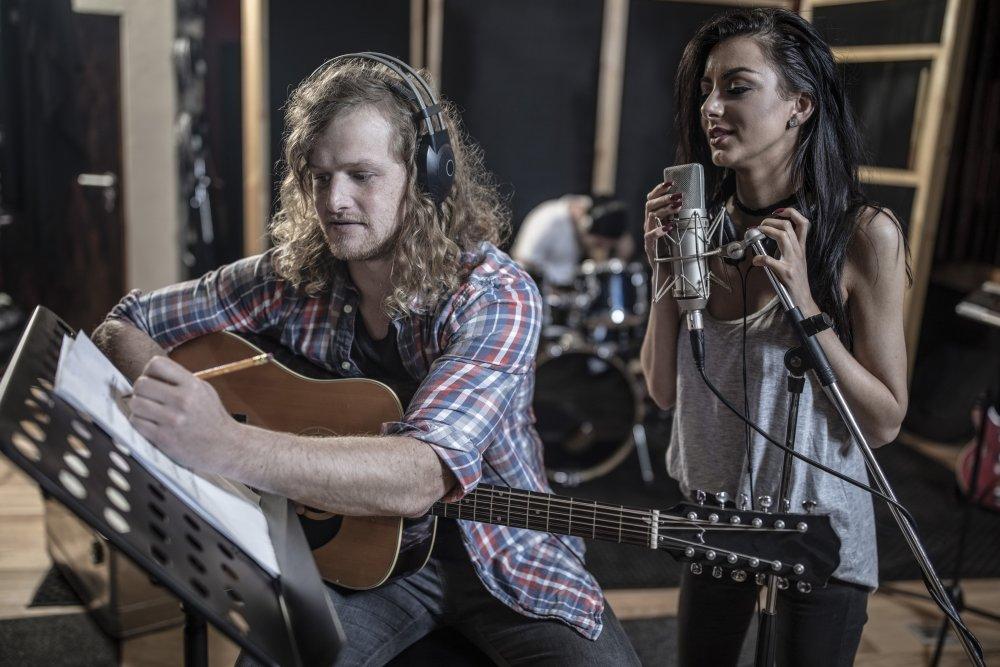We all know that setting goals is an important part of music lessons. And as a singer, you’re working with a very delicate instrument (your voice!) – so you’ll want to set reasonable singing goals and work with a private teacher to monitor your progress. Read on as Buena Park, CA voice teacher Andrew C. describes the process…
If you’re like most singers, you probably have big goals for your voice. You want to become a better singer, reach new vocal heights and make beautiful music. But how do you go about setting and reaching your singing goals?
In this blog post, we’ll show you how to set realistic singing goals and achieve them through practice and perseverance. Let’s get started!
What is the Major Goal of Every Singer?
While every singer has their own individual goals, there are some common goals that all singers share:
- The first and most important goal is to develop a strong vocal technique. This means learning how to use your voice correctly and efficiently in order to produce the best possible sound.
- Another one of the most common goals for a singer is to develop a good breath support system, which will help you to sing with power and control.
- One more common goal for singers is to develop a good stage presence. This means learning how to connect with your audience and communicate your passion for music. Many singers also strive to develop their musicality, which includes learning how to interpret and communicate the emotion of a song.
By working on these major areas, singers can reach their full potential and become truly memorable performers.
Signing up for singing lessons is one of the best things you can do if you want to set and reach attainable goals as a singer. You’ll learn everything you need to know about singing, plus helpful exercises, like what you see below:
https://www.youtube.com/watch?v=huqdwhVX9TI
How to Set Good, Achievable Goals for Singing
We all have goals we want to achieve with our voice. Maybe you want to hit all the right notes in your song arsenal the next time you go to your local karaoke bar. Or maybe you have a very important singing competition coming up and need to focus on singing in tune. It could be you are the lead in a musical and need help with not losing your breath on stage while singing, acting, and dancing. Whatever the goal comes to be, we all have one thing in common… we want to achieve the correct technique to accomplish our goals. There are numerous ways to do this the right way, as well as the wrong way. For the sake of success though, I’m going to focus strictly on the right ways to do this.
Listen to Your Voice
One very easy way is to purchase a voice recorder and listen to your voice. You always sound different in an audio playback mode versus your ear to your voice during a live singing demonstration. (Note: no two recordings will ever be identical.) No money? No worries, use your phone. Most phones nowadays come with an app ready to record your vocals.
Take Good Notes
Along with playback mode, make sure you have a pen and paper. In order to critique your performance, you need notes. Listen to your playback again and again. Jot down your notes of improvement. Rinse and repeat. After you make your modifications, play it back again and compare it to your original recording. Did you improve or fix the problem?
Gather Some Friends
Sometimes we can still be biased toward our performance, so letting someone else critique your recording is always a good thing too.
Another valuable exercise is to get an actual audience of peers (fellow singers) to judge your vocal abilities. Sometimes the ear and sight of a fellow vocalist is just what it takes to correct errors and help us reach the goals we would like to achieve. Also, video is a super awesome resource and probably provides the fastest and most immediate feedback for you to view and correct anything flawed in your musical presentation.
Practice Makes Perfect
Try to approach each rehearsal or voice lesson with one goal. That should be the goal you focus on for the duration of your session. Practice until you get it right. Once you achieve that goal, begin using that acquired music skill in song after song in your arsenal until you become comfortable with the technique. As the story goes, it takes about 12 times of repetition before the mind begins to retain newly-processed information. So get used to burning and engraving your accomplished singing goals into your brain for permanent use.
Sample Goals to Set as a Singer
As a singer, it is important to set goals in order to improve your craft and succeed in the music industry.
While short-term goals can help you stay motivated and focused in the moment, long-term goals can keep you on track for success in the future. Here are a few sample goals that singers can set for themselves:
Short-Term Goals:
- Attend a singing class or workshop to learn new techniques.
- Go to open mic nights and perform regularly to gain stage experience.
- Make a recording of your demo reel or an original song to send to music industry professionals.
- Learn how to sight-read sheet music so that you can audition for musical theater productions.
Long-Term Goals:
- Get signed with a major record label or independent record label.
- Go on tour and perform live shows across the country or around the world.
How to Set Goals for Singing Lessons
When it comes to taking singing lessons, it is important to set realistic goals. After all, singing is a skill that takes time and practice to develop. However, by setting specific goals, you can make the most of your lessons and see significant progress over time.
One way to set goals for singing lessons is to focus on specific skills that you want to improve. For example, you may want to work on developing better breath control or expanding your vocal range. By zeroing in on a few specific areas, you can ensure that each lesson is focused and targeted.
Another way to set goals for singing lessons is to identify songs that you would like to be able to sing. This can give you something to work towards and provide a sense of accomplishment when you are finally able to perform the song. Additionally, by picking songs that challenge you, you can push yourself to improve and reach new levels of ability.
Finally, it is important to remember that progress should be gradual. Rome was not built in a day, and neither will your singing voice. It is important to be patient and consistent with your lessons in order to see results. If you keep these things in mind, you will be well on your way to becoming a great singer.
Goals for Singing Teacher Ideas
Every singing teacher wants their students to sing with excellent technique, but oftentimes we can get so caught up in the technicalities that we forget about the importance of artistic expression.
As a teacher, it is important to set goals for our students that encompass both technical mastery and artistic development. We should challenge our students to develop their own unique style and help them to discover new ways of expressing themselves through song.
By doing so, we can help them to not only become better singers, but also better artists. With this in mind, below are three goals that every singing teacher should strive to instill in their students:
- A commitment to excellence – We should always encourage our students to strive for excellence in their singing. This means working hard to master the technical aspects of singing, such as breath support, vocal placement, and diction. But it also means digging deep emotionally and tapping into their personal experiences to create an honest and powerful vocal performance.
- A love of learning – A good singer is never done learning. We should instill in our students a love of learning new things about their craft. This includes studying different styles of singing, experimenting with new vocal techniques, and expanding their repertoire. By encouraging our students to be lifelong learners, we can help them to reach new heights as singers.
A sense of joy – Singing should be fun! We should encourage our students to find joy in the act of singing itself. This means helping them to let go of any fears or anxieties they may have about singing and simply enjoying the moment. When our students sing with joy, they will radiate positive energy that will touch everyone around them.
Goals to Become a Singer
Becoming a singer takes time, dedication, and lots of hard work. If you’re serious about pursuing a career in music, it’s important to set realistic goals and create a plan of action.
Start by taking singing lessons from a qualified instructor. This will help you develop your vocal technique and range. As you progress, begin performing wherever you can, whether it’s at local coffee houses or open mic nights. The more practice you get onstage, the more comfortable you’ll feel performing in front of an audience.
Also, be sure to record your singing so that you can listen back and assess your progress.
Finally, keep your eyes peeled for opportunities to audition for gigs or competitions; these can help jumpstart your career as a singer. Pursue your passion for singing with single-minded focus, and you’ll be well on your way to achieving your goal.
What Are the 5 Tips for Being a Good Singer?
The term “good singing” is subjective; what one person may deem as good singing, another person may not. However, there are some objective measures of good singing, such as pitch, tone, breath control, vibrato, and power. Below are five tips to help you become a better singer.
- Find your vocal range. You can do this by singing a scale up and down until you find the highest and lowest notes that you can sing comfortably. Once you know your range, you can start to work on expanding it.
- Proper breathing is essential for good singing. When you take a breath, make sure to fill your stomach with air, rather than your chest. This will help you to control your breath and avoid running out of air while singing.
- Vibrato adds richness and depth to your voice. To create vibrato, tighten the muscles in your throat ever so slightly and then let them relax as you exhale.
- Power is an important aspect of good singing. To increase the power of your voice, practice breathing from your diaphragm. This will help you to project your voice without straining your throat.
- Lastly, practice, practice, practice! The more you sing, the better you will become at controlling your breath, hitting the right notes, and producing a beautiful tone. So get out there and start singing!
There Are No Single Best Goals for Singing – Just What Works Well for You!
When it comes to setting goals for your singing, there is no one right way to do things. What works well for one singer may not be the best approach for another. The key is to find what works well for you and to set goals that are realistic and achievable.
Setting goals is the first step on the road to achieving them. Follow these tips to set realistic and achievable singing goals for yourself, and you’ll be well on your way to a successful vocal career – or simply becoming a better singer.
And if you want more personalized help in reaching your singing goals, sign up for singing lessons with one of our expert instructors. We can help you develop healthy vocal habits, improve your range and power, and increase your confidence as a singer. What are you waiting for? Start working towards your dreams today!
 Andrew C. teaches singing, music recording, songwriting, speaking voice and trumpet lessons in Buena Park, CA. He received his degree in music and communications from Pierce College, and specializes in pop, theater and public speaking. Andrew joined the TakeLessons team in February 2013. Learn more about Andrew, or search for a teacher near you!
Andrew C. teaches singing, music recording, songwriting, speaking voice and trumpet lessons in Buena Park, CA. He received his degree in music and communications from Pierce College, and specializes in pop, theater and public speaking. Andrew joined the TakeLessons team in February 2013. Learn more about Andrew, or search for a teacher near you!
Photo by flo and me
Suzy S.

